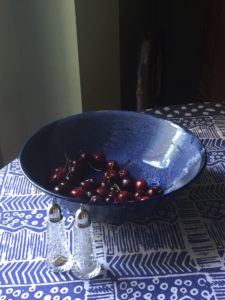
Saturday night, the Cambridge Bail and Legal Defense Fund hosted its first-evah silent auction. A needed, organic offshoot of Friends Meeting at Cambridge’s Prison Fellowship Committee’s ministry, the Fund supports those in need—with an additional, deal-breaking criteria: People on Prison Fellowship must know these potential recipients. People who come to our Wednesday night sharing circle—another PF initiative—or people our members visit in prison, or people our members drive so those folks can visit loved ones in prison, or people known or recommended to PF by greater Boston allies* also working on criminal justice reform; all are eligible for Fund support.
Because PF had never hosted a silent auction before and because we only had about six weeks to pull this thing together, we kept the event small and simple. In-house. So there were a couple of moments Saturday night when the commodious Friends Room felt a little echo-y. Despite the less-than-optimal attendance, however, the Fund raised almost twice its goal! (In lieu of showing up, several people simply mailed us checks—much appreciated!)
Some examples of what was donated: To teach up to 4 people how to make a flaky-crust, amazingly delicious apple pie (my husband donated this so I KNOW all about his pie skills). Or 3 hours of gardening work. Or advice and support re de-cluttering.
Here’s What I Want To Say:
As point person for the auction, I interacted with the (mostly FMC) people who’d donated goods and services. Their generosity was deeply touching—especially those of modest means who nevertheless gave. Equally touching were donors who bravely offered something that involved some personal risk—but offered, anyway. So I have come away from this experience with such gratitude! To have witnessed such generosity, such trust—and faith—has been an enormous gift.
Because the Fund hoped to refill its coffers, the silent auction came from a place of need, offering a few, selected-carefully “big ticket” items (in the hundred$, not the thousand$ range, I hasten to add). The comfortable and the well-off would, basically, have no choice but to bid for these $150 to $300 items, in other words. But the next time we run a silent auction, it’ll come from a place of community-building. We’ll have lots of $5 items. People can just show up on the night of the event with whatever they want to auction; the more stuff the better! We’ll do extensive outreach and publicity. We’ll fill that Friends Room!
Most important: The next day, pretty exhausted, I attended an FMC meeting for business. One agenda item elicited much discussion of “the invisible wall,” i.e. the barrier between our privileged, white, faith community and the rest of the world. “Why aren’t we running a soup kitchen,” someone questioned by way of example.
And I realized that my meeting does run a soup kitchen every Wednesday night at the sharing circle. My FMC entails weekly worship and communion with people of color. My FMC is teaching me the wisdom of Mother Teresa’s commentary: “We can do no great things, only small things with great love.” My FMC is building connections with others in greater Boston doing prison ministry, re-entry support for ex-offenders, criminal justice advocacy et al. My meeting overwhelms me with its generosity and love.
I say these things, not out of smugness but, like the blind man and the elephant, because I only know my own experience, what I, myself, have touched or been touched by.
So, maybe, PF’s outreach needs to begin with FMC?!
* Like the Committee of Friends and Relatives of Prisoners











